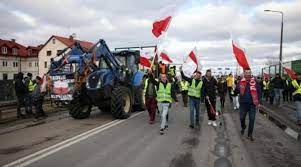WARSAW (Reuters): Polish farmers will step up protests on the border with Ukraine on Tuesday, blocking almost all traffic in what they say is a bid to save their livelihoods but which Kyiv says is damaging its war effort.
Farmers across Europe have been demonstrating against constraints placed on them by European Union measures to tackle climate change, as well as rising costs and what they say is unfair competition from abroad, particularly Ukraine.
“(There will be a) total blockade of all traffic at border crossings,” said Adrian Wawrzyniak, a spokesperson for the Solidarity farmers’ union.
Wawrzyniak said that while military aid would be allowed through, all passenger traffic would be blocked, not only lorries. He said there would be blockades at ports and of motorways.
The protests mark an escalation of the unrest as previous demonstrations by the truckers and farmers did not completely block all border crossings.
Kyiv says its agricultural exports through eastern Europe have not damaged EU markets.
As exasperation with protests in Poland has grown, Ukrainian hauliers said they planned a peaceful round-the-clock protest at three crossings already blocked by Polish farmers.
In a comment to the Ukrinform news agency, their representative said they would control movement at crossings preventing Polish trucks from bypassing the general queue. The protest is planned to last till March 15.
‘EROSION OF SOLIDARITY’
Poland became one of Ukraine’s staunchest allies after Russia launched its full-scale invasion on Feb. 24, 2022, but the border protests have strained relations.
Poland’s new pro-European government has expressed sympathy for the farmers’ demands but has also urged them not to take action that could damage Kyiv’s war effort.
Ukraine says the blockades are affecting its defence capability and helping Russia’s aims.
Ukrainian President Volodymyr Zelenskiy said on Monday the situation at the border demonstrated “the erosion of solidarity on a daily basis”.
He added that only 5% of Ukraine’s agricultural exports passed through the border with Poland, adding that the case was more about politics than about grain.
“We need common decisions, rational decisions, to resolve this situation,” he added.
Poland’s Deputy Agriculture Minister Michal Kolodziejczak, in comments to public radio, rejected such criticism on Tuesday, and suggested that Zelenskiy should come and “see the problems of Polish farmers” for himself.
Agriculture Minister Czeslaw Siekierski has previously said he is negotiating with Ukraine and that a deal limiting imports could be reached by the end of March.
Ukrainian Agriculture Minister Mykola Solsky said on Monday that Kyiv was “ready for all options” and sought a “constructive” solution.
“Some forces are using these protests for provocation, and what you should definitely not do is to give in to provocation,” he said.
GREEKS GREARING UP
Greek farmers were expected to drive into Athens with tractors on Tuesday to protest outside parliament over rising energy costs, competition from abroad and for extra financial aid to tackle the impact of recent flooding.
Farmers unions have been in negotiations with Prime Minister Kyriakos Mitsotakis’ conservative government for weeks, but say the measures announced so far don’t go far enough to meet their concerns and so they are stepping up their actions.
On Monday night, farmers lined their tractors and pickups along highways and gathered at a meeting point in central Greece where they spent the night before heading to Athens.
“There are many problems, most of all the fuel and the energy costs,” said one of the protesting farmers, Christos, in the central Greek region of Kastro.
“Last year was catastrophic for farmers, we did not produce grapes, we did not produce olive oil, we produced a bit of cotton but it was bought for nothing.”
On Tuesday morning, dozens of farmers arrived by boat at the port of Piraeus from the southern island of Crete.
The rally, scheduled for later in the day, was aimed at piling pressure on the government, which has already offered discounts on power bills and a one-year extension of a tax rebate for agricultural diesel to the end of 2024.
The government reiterated on Monday that it is willing to discuss a more permanent tax rebate scheme in the future, but it had no fiscal room for any further concessions this year. Greece has been recovering from a decade-long financial crisis.
“I think farmers acknowledge this and know very well that the government has probably exceeded even their expectations, especially on the power bills issue,” Mitsotakis said during an interview with Greek Star TV on Monday evening.
Farmers in France, Belgium, the Netherlands, Poland and Italy have staged similar protests.
“We’ll see if there is anything else at the bottom of the barrel,” said protesting farmer Dimitris Tsarouchas.







